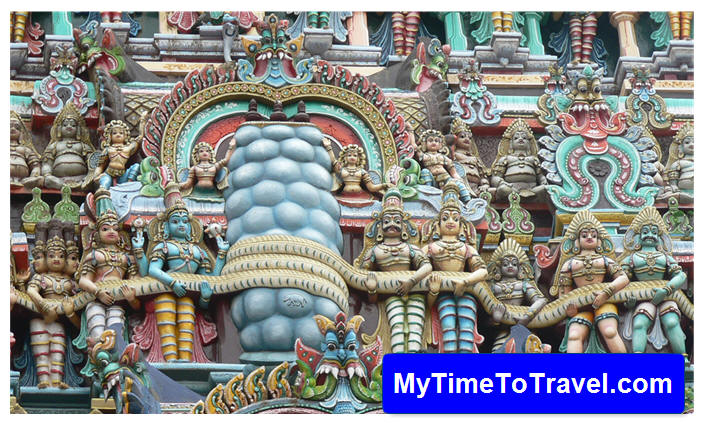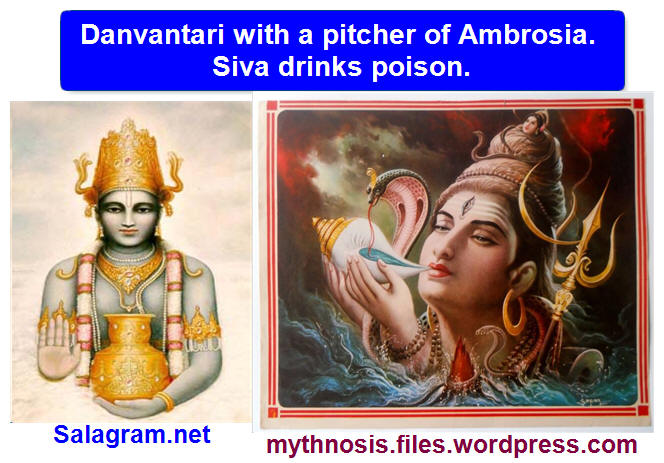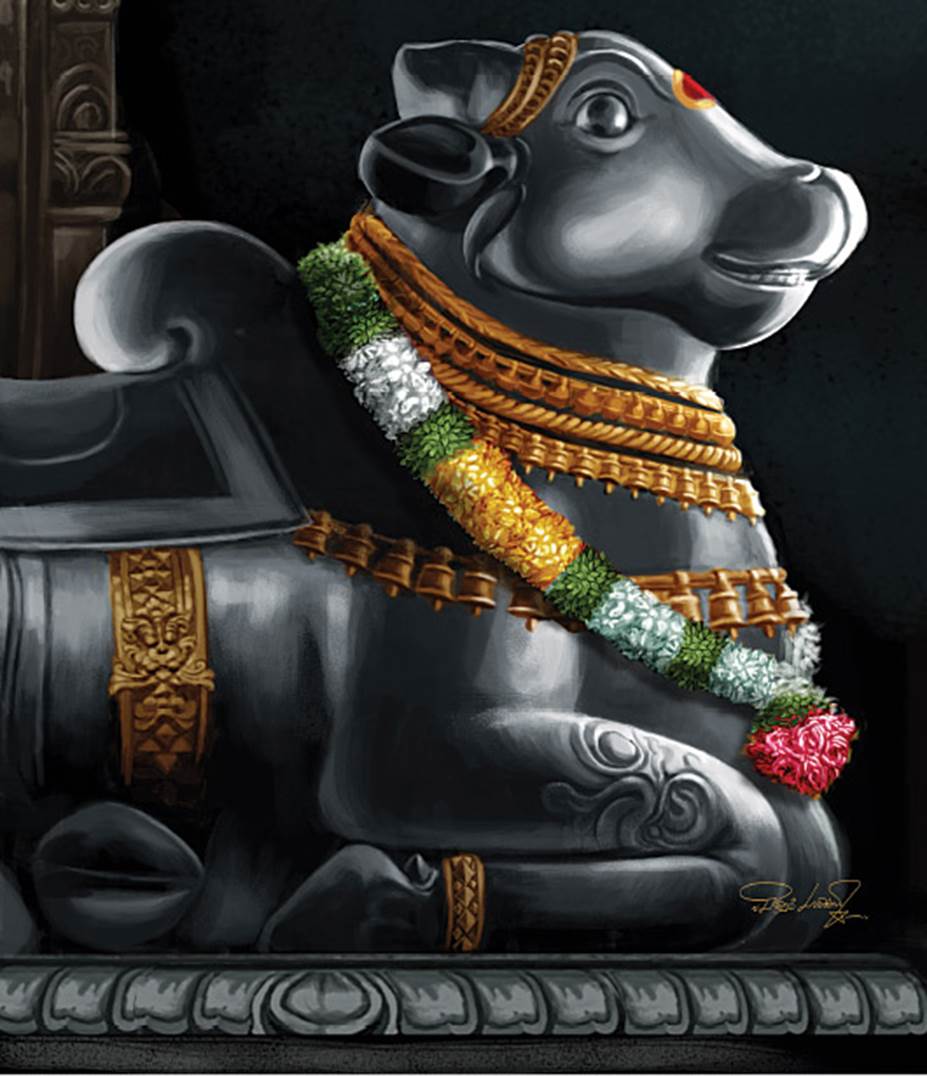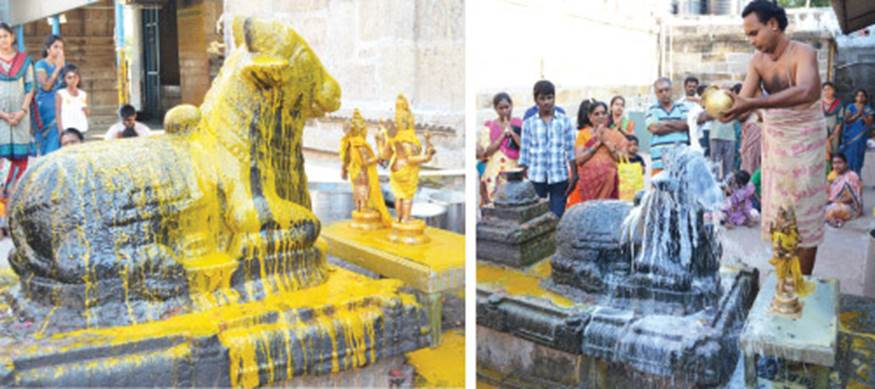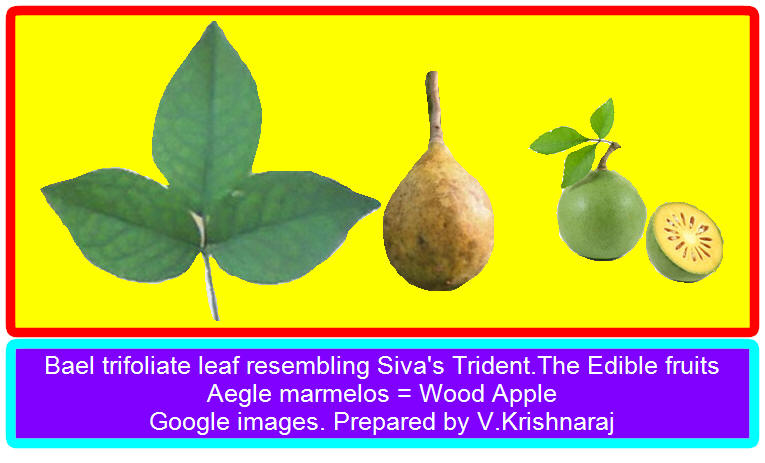Sani Pradosam
Saturday Evening
Introduction: By Veeraswamy Krishnaraj
Saturday evening was a fateful day, when the world of beings were on the brink of Total Annihilation. Siva saved the day and all beings. It is the day for clebration.
Saṉi Pradoṣam (Saturday evening) is the twilight period, when Siva took
the
hālahāla
poison from the Milk Ocean (regenerative ocean) to save devas and all
beings.
பிரதோஷம் piratōṣam , n. < pra-dōṣa. 1. Evening, 3¾ nāḷikai
Evening = the time between noon and sunset, including the afternoon and twilight.
Saṉi Pradoṣam is the most important of Viratams (Vows) for Siva,
particularly the one that comes on a Saturday. The Saṉi Pradoṣams that
fall in the months of Cittirai, Vaikāsi, Aippasi and Kārttikai
(சித்திரை, வைகாசி, ஐப்பசி & கார்த்திகை)
are distinguished as Saṉi Mahā Pradoṣams (Great Saturday Evenings).
Cittirai =
Mid-April to Mid-May.
Vaikāsi =
Mid-May to Mid-June.
Aippasi =
Mid-October to Mid-November.
Kārttikai =
Mid-November to Mid-December.
Of all
months, Kārttikai Sani Pradoṣam (KSP) is of utmost importance.
Observance
of KSP guarantees wedding, progeny, prosperity, good health, success in
all endeavors...
Pradoṣa
Time is the twilight between before-sunset and after-sunset.
Its time zone is between 4 p.m. to 7:30 p.m..
The precise timings are as follows: 3.75 Naḷikai
before sunset and 3.75 Nāḻikai
after sunset.
நாழி
nāḻikai.
Indian hour = 24 minutes = நாழிகை
One Naḷikai
= 24 minutes. 3.75 Naḷikai
= 90 minutes. That is 90 minutes before sunset and 90 minutes after
sunset. That is the auspicious time.
During Pradoṣa
period, all gods assemble in
Śivālaya
(Śiva
Temple); you can't see them, but they are there. There are a lot of
things that are present but we don't see: Example, Air. There is no
darśana of other deities in the temple and yet the devotees
obtain the grace and benefits from all gods.
Among Siva-centric ritual worships,
Śivarātri
and Pradoṣa
are important.
Śiva having taken the poison to save gods and humanity, remained
awake that night: That is
Śivarātri,
the night of Siva. Siva performed a dance in the space between the horns
of the sacred Bull (Nandi), as witnessed by Devas. The moment he took
the poison is Pradosam: the twilight period.
-----------------------------------------------------------------------------------------------------------------------------------------------------------------
On the Pradoṣa
day, the observer takes a shower or bath, applies the sacred ashes,
chants Namasivaya Mantra, goes on fast, observes Pradosam in the
twilight hour, eat the Prasadam (sacrament) and complete the Viratam
(vow). Observance of 11 Pradoṣams
helps attain Siva's Grace.
Wanting immortality, Asuras and Devas churned the Milk Ocean and Hālahāla
poison surfaced. Siva gathered the poison and drank it to prevent
destruction of the world.
Knowing its ill effects and panicking, Parvati in her attempt to prevent
further descent of the poison into the stomach pressed the neck. That
caused Siva’s neck (adjoining and including the throat) become blue in
color, earning him the name Tirunīlakaṇṭar
(=tiru-nīla-kaṇṭaṉ
=The
Lord with blue throat).
ஆலகாலம்¹ ālakālam, n.
< hālahāla. Deadly poison produced during the churning of the ocean
அண்டபகிரண்டம் aṇṭa-pakir-aṇṭam.=
This world and the world beyond this sphere
ஆனந்ததாண்டவம் āṉanta-tāṇṭavam. =
Ecstatic dance of Šiva, as exhibited in the shrine at Chidambaram
பிரதோஷகாலம்
=
பிரதோஷம் piratōṣam
= pra-dōṣa. 1. Evening 2.
before
and after sunset.
Herein continued the Dance of Grace of Siva the Supreme Being (சிவப்பரம்பொருள்).
As if
overtaken by Transcendent Exhaustion, Sivanār
went to bed.
Ādi
śakti, the world and beyond were perturbed. Siva, to remove the dread
woke up with a quick eye and performed the Ecstatic Dance after sunset.
Parameśvara ingested the poison on the 11th day. On the
sacred 12th day, he went to bed as if he was tired. To make
people prosper, he performed the Sandhyā
Dance on the auspicious 13th day (Triodasi) at the evening
twilight hour between day and night, traditionally called
cantiyā-Kālam
(=
Sandhyā
Kālam).
சந்தியாகாலம் cantiyā-kālam
=
sandhyā kālam.
At this auspicious hour in consideration of pradoṣa
period, people perform Siva pūjā
and rejoice. Puranas assert
those who do orderly performance of yearly Siva worship for 14 years on
the Pradoṣa
day will attain
sārūpa state (sārūpya)and
become Siva-Gaṇas.
Saṇi
Pradoṣam
falling on a Saturday is very auspicious. Siva, having ingested the
poison, slept and woken up on a Saturday evening, performed his first
Sandhya Dance; for that reason, people observe and celebrate with great
fanfare, Pradoṣam
falling on a Saturday
சாரூப்பியம்
cārūppiyam, n.
< sārūpya. (Šaiva.) A
blissful condition in which a devotee obtains a form similar to God's,
one of four patavi,
If we read the sacred account of what happened in Ujjain, we will
understand clearly the greatness of Saṉi-p-
Pradoṣam
Saṉi-p-Pradoṣa,
praised by Anjaneya.
Ujjain’s ruler, king Chandraseṉan
had a great Bhakti to Ujjain’s
Īśvara
Vīramāhāḷar.
Sivagaṇanāthar,
a lapidarist visited with the king in the palace and gifted him Cintāmaṇi
gem.
சிந்தாமணி cintā-maṇi
= A mythical gem believed
to yield to its possessor everything that is desired
That gem carries extraordinary greatness (powers).
The neighboring kings knowing its uniqueness, cautioned
(threatened) the king with prospect of war, if
Chandraseṉan
did not leave it to their ownership. The king ignored their warning.
.
The neighborhood kings became angry and laid Ujjain in seize.
There was a danger of war at any moment.
Despite the imminence of war, Chandraseṉan
entertained no worries. The
brave king went to temple, performed worship according to injunctions
and meditated with his mind and soul on Siva, the three-city-burner.
A Yādava
boy watched the king throughout the ceremony.
It rose in his mind he should also engage in a similar worship,
and returned home.
It was dawn next day. The youngster started his
Śiva
Pūjā.
He took a rock and stood it like the Liñga. He took mud and leaves as
the accouterments for Puja. He partitioned the mud and the leaves as
Sandalwood paste, garland, ablution (Ganges) water, incense, lamp,
sacred cloth… He offered worship with love and care to Araṉ
(Śiva).
At the conclusion of the worship, he went into meditation.
It was night. His mother called him for supper. He in meditation did not
answer her repeated calls. She came in a fit of anger. She beat him up
and toppled and threw the Siva-liṅga-stone and went home to retire for
the night.
Seeing the devastation by his mother, he cried, “My mother threw away my
deity.” and fainted. In
three-quarters of an hour, he woke up free from his faintness. He got up
gingerly. He could not believe his eyes. There was a scattering of gems
and gold all over the house. The stone lingam thrown by his mother shone
like a gem. The youngster
was immersed in transcendent happiness.
The youngster’s mother woke up suddenly. She was wonder-struck
seeing the house become a repository of gems and gold.
The news spread to the king.
He left his palace for the cowherd neighborhood and paid homage
to the resident deity and circumambulated it.
He embraced the Yādava
youth. The townspeople raised an adulatory panegyric uttering the name
of Siva.
The kings lying in wait hearing of the happiness, hustle and bustle of
the townspeople, were astounded. Learning the cause from their spies,
the kings in a state of horripilation wondered about the grace of Siva.
The kings in wait sent their soldiers back to their respective
countries, entered the town, sought forgiveness from the king under
seize, worshipped the rocky stand-in for Siva Lingam and expressed
rapture over the auspicious event. At that moment, Anjaneya walked in.
Chandraseṉan offered worship to him with respect and adulation.
Anjaneya embraced the youth and said, “O kings! Hear ye, hear ye. Have
you not seen the Dharsan given by grace-giving and pleased Sivaperuman
in response to this innocent youth’s worship? This youth performed Siva
Pūjā,
emulating Chandraseṉa in worship of Siva Peruman on the day of Sani
Pradoṣam.
The fruits of Sani Pradoṣam worship and Dharsan do not have any
limitations and do not stop.
In this youth’s lineage, eighth in line will be the Avatara of
Mahavishnu as Krishna. To
raise him, the king of cowherds Nandan will appear to increase the pride
of this family. From today,
call this youth
Śrīdhara.
Anjaneya instructed the youth on the intricacies of Siva Puja and took
leave.
For performing Sani pradoṣa, there are benefits. Think of Vrata Puja:
how much more benefits will they acquire? Can you measure it?
We know now of the greatness of Sani Pradoṣa. Let us learn the
procedures in the worship of Nandi-yemperuman on the day of pradoṣa.
Nandi Dharsan!
At the time of pradoṣa, there is a special greatness for Nandi. On this
occasion, we should worship and obtain Dharsan of Siva-Liñga by looking
at it from the space between the two horns of Nandi-Yemperuman (the
Sacred Bull, anthropomorphic Siva).
Having ingested the poison, gone to sleep, awakened and performed such
divine acts, he made an appearance to Ambika and performed the Sandhya
Dance. Nandi Deva (the
divine Bull), having seen the dance, expanded in size in a state of
bliss. Kailas was hidden from view by this expansion.
The devas had a rapturous experience by watching the Dance of
Siva from the space between the two horns of Nandi.
On this occasion the grass-garland should be applied to Nandi.
Bael leaves, Southernwood, Jasmine flowers can be used for
decoration.
அறுகம்புல் aṟukam-pul
= Harialli grass, Cynodon dactylon
On this occasion, we should pay homage to Nandi with a garland of grass.
Bilva leaves,
வில்வம்
= Bael. Aegle Marmelos=
வில்வமரம்;
மருக்கொழுந்து = Southernwood. மல்லிகை = Jasmine flowers.
நந்திக்குக் காப்பரிசி எதற்கு?
காப்பரிசி kāpparici, n.
<
காப்பு +.
1. Rice mixed with treacle generally distributed on the occasion when a
new-born baby is provided with bangle
When Devas and Asuras feared the effects of
ālakālam
poison (hālahāla),
came to Kailas and appealed to Siva for protection, he assured them not
to fear. He called on Nandikesvara and ordered the poison brought to
him.
Having paid homage to Isa, Nandibhagavan walked towards the poison. Its
heat has ‘changed’ and he brought it to Siva. Isa drank the poison.
Ambika remaining by his side touched his neck softly; that poison
stagnated in the neck.
Seeing it Nandibhagavan smiled mockingly.
In a mocking tone of voice, he
said, “Is that poison so fierce? Does this poison, carried by me, have
such power to kill?”
எகத்தாளம் ekattāḷam
, n. < K. egatāḷa. See
எகத்தாளி.
எகத்தாளி
ekattāḷi , n. < T. egatāḷi. [K. egataḷi.] Mockery,
jest, ridicule;
பரிகாசம்.
Immediately Siva Peruman summoned Nandi to his presence opening his palm
that held the poison while he ate it and said, “Here is my palm, smell
it.” Nandibhagavan smelled Siva’s palm. In that second, he lost his
consciousness, fell down, got up, cried, laughed, committed a few
mischievous acts as if he was mad, and just wandered around.
The mother of all living beings of the world, on seeing Nandi was
saddened and pleaded with Siva saying, “Swamy, how could you deal such
punishment to Nandi? Enough. Please forgive him.”
Siva spoke to Ambika, saying, “Uma Devi, He spoke in an egoistic manner.
To subdue him, we did such a deed.
He suffered this much by smelling the poison. Imagine the trouble
he would have had if he drank it.
We did it this way to point it out to him. Mix rice flour with
jaggery and give the mixture to him. He will regain his balance and come
back to his senses as before.
Ambika carried out Siva’s instructions.
Nandi, eating the rice-jaggery mixture, regained his normal
senses (his usual self). From
that day onwards, on every Pradoṣa day, Kāpparici
Naivēdya (=
காப்பரிசி நைவேத்தியம்
= offerings of rice flour and jaggery) is offered.
The saying of Tirugnanasambandar goes like this: Nandi takes the lead in
offering boons and Dharsan (sight). Nandi’s name Namasivaya.
Nandi means growth.
It is common to call Nandi those who are supreme in Jñāna
and Guṇa
(wisdom and quality). We
need God’s grace in improving quality of life and wisdom.
Nandi Dharsan helps us in that effort. This 2016 November (12th
to 26th) it is our good fortune to have Sani pradoṣa. On
those days, it is imperative to visit the Siva temple at the appropriate
time for worship. Besides, we should pay homage to Nandi so that through
him we obtain boons from Siva and live happily.
Let us get anticipatory guidance
and special knowledge of Nandi
and the temples to obtain his grace in full measure and live happily.
